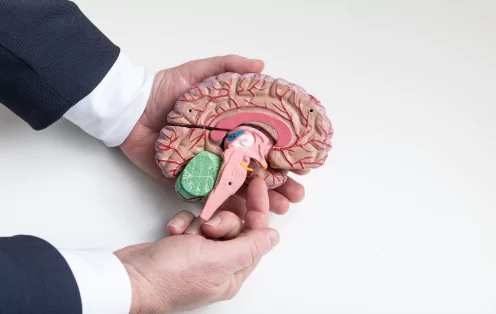Brain tumours
Brain tumours
Brain tumors are abnormal growths of cells within the brain that can be either benign (non-cancerous) or malignant (cancerous). They can originate in the brain (primary brain tumors) or spread to the brain from other parts of the body (secondary or metastatic brain tumors). Our team of neurosurgeons and neurologists is committed to providing comprehensive care for patients with brain tumors, from diagnosis through treatment and follow-up.

Common Types of Brain Tumors
- Gliomas: Tumors that originate from glial cells, including astrocytomas, oligodendrogliomas, and glioblastomas.
- Meningiomas: Tumors that develop from the meninges, the membranes that surround the brain and spinal cord.
- Acoustic Neuromas (Schwannomas): Tumors that develop on the nerve that connects the ear to the brain.
- Pituitary Adenomas: Tumors that occur in the pituitary gland, which can affect hormone levels.
- Medulloblastomas: Common in children, these tumors start in the cerebellum or posterior fossa.
- Metastatic Brain Tumors: Tumors that have spread to the brain from cancers in other parts of the body, such as the lungs, breasts, or kidneys.
Symptoms of Brain Tumors
- Persistent headaches
- Seizures
- Nausea and vomiting
- Vision or hearing problems
- Balance and coordination difficulties
- Cognitive or personality changes
- Weakness or numbness in parts of the body


Evaluation and Diagnosis
Diagnosing a brain tumor involves a combination of neurological exams, imaging tests, and sometimes a biopsy. Our diagnostic process may include:
- Magnetic Resonance Imaging (MRI): Provides detailed images of the brain’s structure.
- Computed Tomography (CT) Scan: Helps visualize brain abnormalities.
- Positron Emission Tomography (PET) Scan: Assesses metabolic activity of the tumor.
- Biopsy: Involves extracting a small sample of tumor tissue for microscopic examination.
Treatment Options
Treatment plans for brain tumors are tailored to the type, size, location, and grade of the tumor, as well as the patient’s overall health. Options may include:
- Surgery: The primary treatment for many brain tumors, aimed at removing as much of the tumor as possible.
- Radiation Therapy: Uses high-energy beams to kill tumor cells or stop them from growing.
- Chemotherapy: Uses drugs to kill cancer cells or stop their growth.
- Targeted Therapy: Involves drugs that target specific aspects of cancer cells, such as proteins or genes.
- Clinical Trials: Opportunities to participate in research studies evaluating new treatments.

